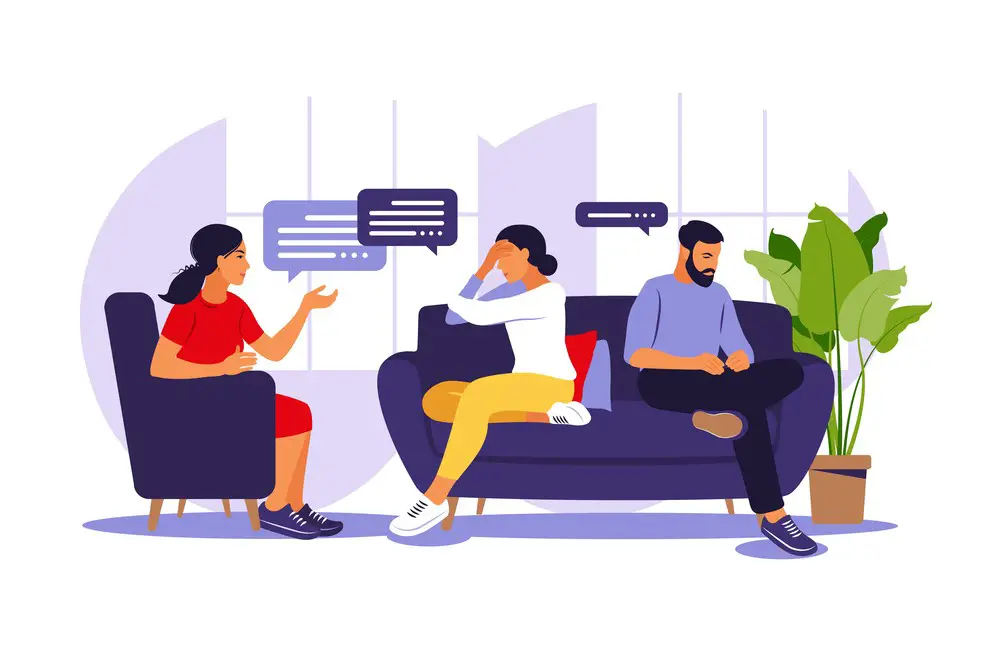As a BetterHelp affiliate, we receive compensation from BetterHelp if you purchase products or services through the links provided
Couples therapy is valuable for those seeking to enhance their relationships, resolve conflicts, or address specific issues affecting their partnership. Licensed mental health professionals working with couples provide this therapy to improve communication and foster emotional and relational growth. In each session, couples can expect to discuss their concerns and work collaboratively with the therapist to develop healthy strategies for managing their relationship dynamics.
Understanding the treatment approaches used in couples therapy is essential for selecting the most appropriate method for one’s needs. Various therapeutic methods, such as cognitive-behavioral therapy, emotionally focused therapy, and the Gottman method, may be employed depending on the couple’s issues and the therapist’s expertise. As the cost of couples therapy can vary significantly, considering factors such as insurance, location, and the therapist’s experience is vital in choosing an affordable and effective option.
Key Takeaways
- Couples therapy aims to improve relationships by addressing conflicts and fostering communication.
- Various treatment approaches are available, depending on the specific needs of the couple and the therapist’s expertise.
- Costs of couples therapy can vary, so considering factors such as insurance, location, and experience will help find an affordable option.
 Understanding Couples Therapy
Understanding Couples Therapy
Couples therapy is a form of psychotherapy that aims to improve the relationship between partners. It focuses on enhancing communication and understanding, promoting emotional and mental health, and resolving conflicts that may have arisen in the context of the relationship. It is not exclusive to married couples; couples counseling can benefit any romantic partnership.
One of the key aspects of couples therapy is addressing attachment issues that may be affecting the relationship. Attachment refers to the emotional bond established between individuals, and it plays a significant role in building a healthy and secure partnership. By exploring these attachment patterns, therapists can help couples better understand their emotional dynamics, fostering healthier and more satisfying relationships.
Couples therapy usually involves both partners working with a mental health professional trained in specific approaches and therapeutic techniques designed for working with couples. These professionals analyze the couple’s interaction patterns, identify conflict areas, and then explore more adaptive ways of effectively managing these issues. Techniques may include active listening, empathy training, conflict resolution, and problem-solving.
Couples therapy often begins with an initial assessment, during which the therapist gathers information about the relationship, its history, and any pressing issues that need to be addressed. Therapists may also use various tools and assessments to identify specific areas of concern, such as communication problems or attachment insecurities. This information is then used to create a personalized treatment plan that addresses individual and couple-focused goals.
In summary, couples therapy is a valuable resource for people in romantic relationships seeking to improve communication, repair attachment issues, and develop healthier relationship skills. Through expert guidance and skillful interventions, therapists can help couples create more satisfying and stable relationships built upon a foundation of mutual understanding, trust, and intimacy.
 Knowing the Therapist
Knowing the Therapist
When looking for a couples therapist, it’s essential to consider the therapist’s qualifications and expertise. A qualified couples therapist will have specific training, skill, and experience working with couples and relationships. They may also be a family therapist or licensed psychotherapists, as both specialties involve working with relationship dynamics.
A therapist’s clinical experience will also impact the overall effectiveness of couples therapy sessions. A more experienced therapist will better understand couples’ various issues and be better equipped to help clients navigate and resolve these challenges.
Several professional certifications are also available for therapists who want to specialize in couples therapy. One such certification is the Certified Gottman Therapist (CGT), offered by The Gottman Institute, which focuses on the Gottman Method Couples Therapy. Another reputable certification is the Certified Emotionally Focused Therapist (CEFT) provided by the International Centre for Excellence in Emotionally Focused Therapy (ICEEFT).
To evaluate a potential therapist’s skill level, ask about their training, experience, and certifications specific to couples therapy. Furthermore, inquire about their familiarity with therapeutic approaches, such as Emotionally Focused Therapy (EFT), Imago Relationship Therapy, or the Gottman Method. These various modalities can prove helpful based on each couple’s unique needs.
Lastly, selecting a therapist who demonstrates an understanding of the diverse experiences couples may face, such as dealing with cultural differences or navigating the complexities of blended families, is important. A therapist who appreciates each couple’s unique experiences and backgrounds is more likely to provide tailored treatment and guidance for relationship improvement.
Knowing your therapist’s background, qualifications, and clinical experience is crucial in finding the right fit for couples therapy. It is a fundamental step in ensuring a successful therapeutic journey that will benefit both partners.
 Treatment Approaches in Couples Therapy
Treatment Approaches in Couples Therapy
Therapists utilize various treatment approaches in couples therapy, each tailored to address specific issues and accommodate the unique dynamics of various relationships.
One popular approach is the Gottman Method, developed by Dr. John Gottman. This evidence-based method nurtures greater understanding, connection, and empathy between partners. Gottman’s method teaches couples conflict resolution skills by emphasizing the importance of effective communication, shared goals, and emotional support.
Another approach is PACT (Psychobiological Approach to Couple Therapy), founded by Dr. Stan Tatkin. PACT helps couples better understand their partner’s behavior and reactions, promoting a more secure and functioning relationship. Rooted in neuroscience, psychology, and attachment theory, this method aims to help couples create a foundation of trust and safety.
Imago Relationship Therapy is an integrative approach created by Dr. Harville Hendrix and Dr. Helen LaKelly Hunt. Imago therapy encourages partners to explore their personal histories to understand the root of their relationship patterns better. It emphasizes the power of compassionate communication and helps partners connect deeply emotionally.
Regarding psychiatric treatments, certain therapies may be incorporated within couples therapy sessions to address any underlying mental health concerns affecting the relationship. Depending on the specific issues presented, these might include cognitive-behavioral therapy (CBT) or dialectical behavior therapy (DBT).
Emotionally Focused Therapy (EFT), developed by Dr. Sue Johnson, is another popular approach in couples therapy. This method is grounded in attachment theory and helps couples identify and overcome negative patterns within their relationship. EFT focuses on increasing emotional intimacy, promoting healthy attachment, and strengthening the couple’s bond.
Regardless of the specific approach, couples therapy aims to provide a supportive environment for partners to explore their relationships, address challenges, and develop essential skills to maintain a healthy and fulfilling connection. Couples must find a therapist specializing in the best method that suits their needs, ensuring the most effective treatment possible.
Addressing Specific Issues in Therapy
Couples therapy can address various relationship issues, including infidelity, distress, substance abuse, trauma, and depression. These difficulties may often stem from one or both partners experiencing various challenges, such as childhood trauma or PTSD.
One common issue couples face is infidelity or an affair, which can create feelings of betrayal and distrust. Couples therapy can help partners work through the underlying issues that may have led to the affair and rebuild trust and communication between them.
Relationship distress can manifest in various ways, including frequent arguments, emotional distancing, or feelings of dissatisfaction. Couples therapy can assist in identifying the underlying causes of the distress and teach partners effective strategies for resolving conflicts and improving the relationship’s overall quality.
Substance abuse can severely impact a relationship’s health, leading to emotional turmoil and the erosion of trust between partners. Couples therapy can support both partners, helping them understand the impact of the addiction and explore strategies for recovery that include individual and joint therapies, such as art therapy.
Trauma-related issues, such as childhood trauma or PTSD, can disrupt a couple’s connection and create difficulties. Couples therapy can be essential in helping partners understand each other’s experiences, develop empathy, and establish a supportive and safe environment for healing.
Depression is another common challenge that can affect one or both partners in a relationship, often leading to feelings of isolation or hopelessness. In couples therapy, therapists may utilize various approaches to address depression, including cognitive-behavioral and interpersonal therapy.
In conclusion, couples therapy is a versatile tool for addressing specific issues within a relationship. It can offer crucial insights and effective strategies for tackling various difficulties, including infidelity, distress, substance abuse, trauma, and depression. Through committed effort and the guidance of a skilled therapist, couples can navigate life’s complexities and work towards healthier, more fulfilling relationship experiences.
What to Expect in a Therapy Session
During couples therapy, individuals can expect sessions to be tailored to their unique relationship dynamics. A variety of session types may be employed, such as in-person sessions or, if necessary, virtual options through platforms like Zoom. Couples therapists typically offer individual sessions for each partner alongside joint sessions to dive deeper into each person’s experiences and emotions.
A key aspect of couples therapy is fostering a safe space for both partners to discuss and understand their problems without fear of judgment or retaliation. The therapist maintains a neutral, unbiased atmosphere to ensure that the session feels balanced and constructive for both individuals.
Throughout the therapy process, the therapist may assign homework or activities for the couple to work on outside of the session. These tasks can range from communication exercises to exploring specific emotions within the relationship. These activities help couples to practice new skills and reinforce positive behaviors within their relationship dynamics.
Therapists use various strategies and techniques during sessions, such as facilitating open and honest conversations, teaching communication skills, and exploring emotional patterns. They also work on conflict resolution strategies and coping mechanisms to help the couple build a healthier relationship.
In sum, attending couples therapy sessions involves working with a therapist to create a safe, non-judgmental environment where both partners can discuss their concerns openly, engage in activities to improve their communication and connection and receive support from the therapist and one another.
Couples Therapy Costs and Insurance
Couples therapy can be a valuable investment for those looking to improve their relationship. The costs of couples therapy can vary widely depending on several factors, such as the therapist’s experience, location, and duration of the sessions.
On average, couples therapy sessions can cost between $100 to $200 per hour, with some experienced therapists charging upwards of $300 per session. Some therapists also offer sliding scale fees, which means the cost is adjusted based on the couple’s income level. This can make therapy more accessible for couples with varying financial means.
Insurance coverage for couples therapy can be a complex issue. Some plans do cover couples therapy, while others do not. Couples need to check with their insurance provider to understand the extent of coverage they have for couples therapy. In most cases, coverage may be dependent on whether the therapy is deemed “medically necessary.” Additionally, some therapists may not accept insurance, so discussing payment options before beginning therapy is crucial.
Here are some cost factors to consider when looking into couples therapy:
- Experience of the therapist: Therapists with extensive experience or specialization may charge higher fees for their services.
- Location: Therapy costs vary by region, with metropolitan areas generally having higher fees than rural regions.
- Session duration: Some therapists may offer extended sessions, which could influence the overall cost of therapy.
Remember that attending couples therapy can be an investment in a relationship’s long-term health and well-being. While the costs can be a determining factor for couples, it’s crucial to find a therapist who is the right fit and who can effectively address the couple’s unique needs and concerns.
 Considering Factors Beyond Cost
Considering Factors Beyond Cost
When seeking couples therapy, it’s essential to consider factors beyond the cost of the sessions. A couple’s needs and situation should be the primary focus when selecting a therapist. Consider the convenience of the therapy sessions when choosing a therapist, as the location and availability of the professional will impact the overall experience.
Finding a good fit in a therapist is crucial for successful therapy. It’s essential to discuss each partner’s goals and expectations before committing to a specific practitioner. Seeking referrals from trusted friends and family members can help narrow the pool of potential therapists. Still, ensuring that the therapist’s approach aligns with the couple’s needs and preferences is vital.
The setting of the therapy matters as well. Private practice therapists may offer a more intimate setting than larger clinics or therapy centers, making individual couples feel more comfortable expressing their concerns. Additionally, some therapists specialize in specific issues such as parenting conflicts, communication difficulties, or intimate matters, so explore these options to find the best fit for each couple’s situation.
Keep in mind the importance of the therapist’s credentials. While a higher degree or more extensive experience may come with a higher price tag, investing in a qualified therapist can lead to better results in a shorter period. Coupling these considerations with finances will help couples find the most appropriate therapist for their needs and budget.
Above all, it’s vital to remember that couples therapy aims to improve the relationship, so prioritize factors that lead to a productive therapeutic partnership. Weighing these elements and costs will ensure couples choose the right path toward a stronger bond and healthier relationship.

The Role of Family in Couples Therapy
In couples therapy, the involvement of family members such as children and other relatives can be an important element in addressing relationship issues. Family therapy, a branch of psychotherapy, aims to resolve conflicts and improve communication within the family unit. When applied in conjunction with couples therapy, family therapy can contribute significantly to the success of the treatment.
One aspect of incorporating family into couples therapy is working together to identify patterns within the family dynamics contributing to the issues at hand. For instance, partners may have established certain roles or expectations in their relationship that are influenced by their family backgrounds. Including family members in sessions can help reveal these patterns in a safe and supportive environment. This provides valuable insight into the couple’s relationship and allows them to make constructive changes.
Furthermore, children can be directly affected by their parents’ relationship difficulties, and involving them in therapy sessions is essential to their emotional well-being. Addressing children’s thoughts, feelings, and reactions to their parent’s relationship struggles can help them better cope with the changes. In addition, it can also provide the couple with insight into how their conflicts impact their children, thus helping them become more aware of their actions and develop healthier ways of communication.
Including family members in couples therapy is also important when addressing issues affecting the entire family system. In some cases, the problems faced by the couple may be rooted in conflicts with other family members. Inviting these individuals to participate in therapy sessions opens the opportunity to resolve these conflicts and restore harmony within the family.
In summary, the role of family members in couples therapy is significant. Their involvement can help couples gain insight into familial influences that impact their relationship, encourage healthier communication, and support their children’s emotional needs.
Additional Therapy Options
In addition to couples therapy, various additional therapy options can also benefit individuals and couples seeking support.
Individual therapy is helpful for individuals who may need to address personal issues impacting their relationships. This allows one person to work on their challenges before joining couples counseling. Group therapy involves interacting with other couples or individuals with similar concerns in a group led by a mental health professional. Group therapy can provide a supportive environment to discuss relationship challenges and learn from others’ experiences.
Premarital counseling is designed for engaged couples preparing for marriage. It often covers topics such as communication, conflict resolution, financial planning, and family dynamics. Premarital counseling can create a solid foundation for a healthy and lasting marriage.
Regain is an online platform offering couples and individual therapy. It’s an accessible and convenient option for those seeking professional assistance outside traditional face-to-face therapy. Online therapy options can provide flexibility while maintaining the benefits of working with a licensed therapist.
Psychotherapy is a general term for various therapeutic techniques that can help explore and resolve personal issues affecting relationships. There are different approaches within psychotherapy, like Cognitive Behavioral Therapy (CBT), which is particularly effective for individuals and couples troubled by negative thought patterns and behaviors. CBT can equip individuals with the tools necessary for lasting change.
When seeking a mental health professional to guide your therapeutic journey, consider using resources such as the Psychology Today Therapy Directory. This reputable directory can help connect you with psychologists specializing in various fields, such as couples, individual, and group therapy. By exploring these additional therapy options, individuals and couples can find the most suitable support for their needs.
Frequently Asked Questions
What is the average cost of marriage counseling?
The average cost of marriage counseling varies depending on the therapist’s location and experience. Generally, it ranges from $75 to $200 per session, and online counseling costs $60-90. Prices may also differ based on session length, lasting 45-90 minutes. Remember that each couple’s needs vary; the total cost will depend on session frequency and duration.
How much does online couples therapy usually cost?
Online couples therapy costs roughly the same as in-person therapy, ranging from $75 to $200 per session. However, since online therapy can be more accessible and flexible, it may be a more cost-effective option for some couples.
Are there any affordable options for couples counseling?
Yes, there are affordable options for couples counseling. One option is to look for therapists who offer sliding scale fees based on a client’s income. Some local community mental health centers or non-profit organizations may also provide low-cost services. Another option is group therapy, which often costs less than individual sessions.
What is the range of prices for couples therapy sessions?
Couples therapy sessions can range in price from as low as $25 per session through community mental health centers or non-profit agencies up to several hundred dollars per session with highly experienced therapists. Most therapists charge between $75 to $200 per session.
How does the cost of in-person couples therapy compare to online sessions?
In-person couples therapy and online sessions are fairly similar in cost, ranging from $75 to $200 per session. Both options have unique benefits: in-person therapy often enables deeper connections, while online therapy provides increased accessibility and convenience. The choice ultimately depends on the couple’s preferences and circumstances.
Is it possible to find free or low-cost marriage counseling nearby?
It is possible to find free or low-cost marriage counseling nearby. One way is to contact local community mental health centers or non-profit organizations, often offering affordable services. Additionally, some universities with graduate psychology programs have training clinics that provide low-cost services under the supervision of licensed professionals.
Jacob Maslow: Advocate for Mental Health & Resilient Voice in the Legal Battlefield
Jacob Maslow brings a rich tapestry of personal experience to his writing. As the author of “How Much is Couples Therapy: Costs and Factors to Consider,” Jacob’s journey is deeply intertwined with mental health, having both benefited from therapy and relied on Lexapro for management. Navigating a challenging court battle due to an ex-partner’s severe narcissistic tendencies, Jacob knows the pain of alienation from loved ones. However, his daily long walks testify to his resilience and quest for clarity. Through his writings and a dedicated legal site, Jacob stands as a beacon for those facing mental health struggles and the challenges of contentious custody battles, advocating the belief that anyone can rise above their challenges.
- 3 Ways Wearing a Hat Can Help Lower Your Stress Levels - April 19, 2025
- Breaking the Silence: Why Men’s Mental Health Matters More Than Ever - April 15, 2025
- How to Transform a Home’s Patio Space into a Relaxing Space - March 23, 2025
This site contains affiliate links to products. We will receive a commission for purchases made through these links.


 Understanding Couples Therapy
Understanding Couples Therapy Knowing the Therapist
Knowing the Therapist Treatment Approaches in Couples Therapy
Treatment Approaches in Couples Therapy
 Considering Factors Beyond Cost
Considering Factors Beyond Cost
